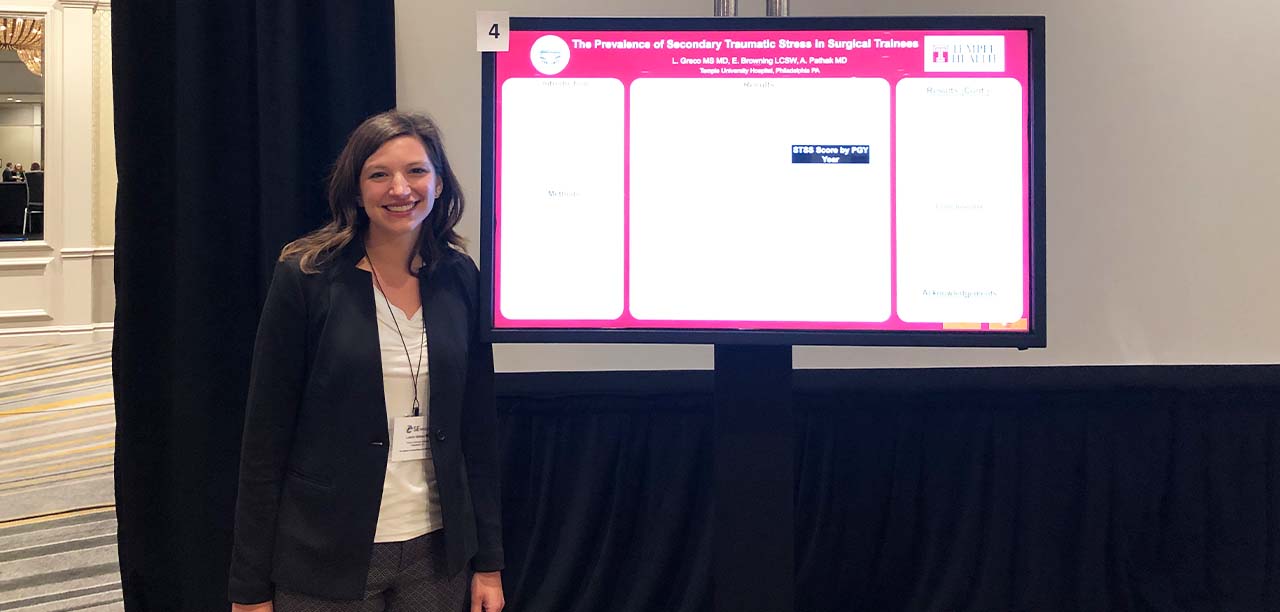
From the beginning of their careers as surgeons, our residents engage in research activities aimed at increasing knowledge and promoting advances in surgical care. There a variety of opportunities to accomplish this goal. Current residents have participated in basic science, clinical, outcomes/health services, global surgery, public health and health policy research.
Each year a few surgical residents elect to spend two years dedicated to scholarly activities and obtaining additional research training. Many residents also elect to obtain an additional degree at Temple during this two-year period. Residents have recently obtained a Masters in Translational Sciences, a Masters of Public Health, Masters of Health Administration, and a Masters in Entrepreneurship; residents are also now enrolled in new Masters of Science in Education in Professional Health Education program.
Research Infrastructure
All residents are expected to engage in scholarly activity during their residency. Residents who take two years to focus on professional development also work with a research mentor who guides the resident to become an independent investigator. These residents are expected to present at multiple regional and national meetings and to graduate with multiple publications.
The Department of Surgery has dedicated research administrators who assist with the development, funding and execution of research proposals. Statistical support for advanced analysis is also provided.
Basic Science Research Opportunities
General surgery residents participate in basic science research projects in a variety of departments within Temple University. Below is a list of some of the research centers at Temple where surgery residents have worked.
Center for Metabolic Disease Research Program (CMDR): CMDR is designed to conduct basic science and clinical relevant research to identify the cause-effect relationship between novel therapeutic targets and the pathogenesis of metabolic diseases and vascular pathologies associated with metabolic diseases. Residents have worked with Dr. Dr. Xiao-feng Yang and Dr. Eric Choi in the division of vascular surgery on signaling molecules in angiogenesis.
Temple Cardiovascular Research Center (CVRC): CVRC is a consortium of basic and clinical scientists with a broad mission to develop new knowledge that will lead to better understanding of the causes of cardiovascular diseases.
Temple Department of Bioengineering: Residents have worked under the direction of Dr. Evangelia Bellas and Dr. Christine Jones at Temple University’s School of Bioengineering/Division of Plastics and Reconstructive Surgery, investigating adipose tissue structure and function.
Research Training
Details of some of the research infrastructure and training opportunities available to surgical residents at Temple University are listed below.
Temple University College of Public Health: Along with multiple other training tracts, the Temple University College of Public Health offers a Masters in Public Health in Epidemiology. This program has provided many of our surgical residents with expertise in; study design and appropriate data analyses that can be used to accurately quantify and assess population-based, health-related outcomes; data management of health-related cross-sectional, experimental, longitudinal and survey data; and real-world problem solving through experiential training.
Temple University Fox School of Business Masters in Health Administration: This program is designed to allow health care professionals to apply financial analysis and modeling to facilitate diagnosis and decision-making; build translatable leadership and consulting skills for different areas of healthcare; and manage business operations effectively in global, regional and organizational cultures.
Temple University Lewis Katz School of Medicine Global Surgery Initiative: This program provides residents with exposure to global health. Residents typically complete a Masters of Public Health in Epidemiology while participating in global surgery research projects in collaboration with surgeons in Ghana and Tanzania.
Clinical Health Services Research Certificate: The Clinical Health Services Research (CHSR) Graduate Certificate in Temple’s College of Public Health is a 12-credit program that trains students in the foundations of health services and population health research, with the goal of becoming informed collaborating members of healthcare research teams.
Harwick Surgical Resident Research Symposium: Each year students and residents have the opportunity to present their research at the department of surgery Harwick Surgical Resident Research Symposium.
